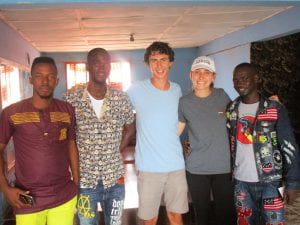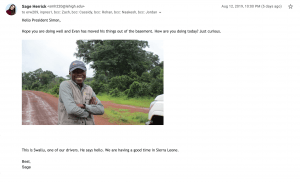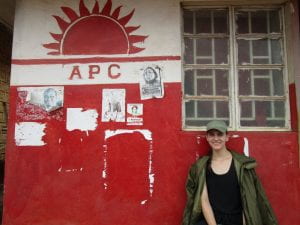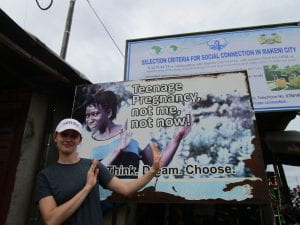The team didn’t leave the Makambo until 10:00 AM and that was a true blessing. Hassan called me at 9:22 AM saying he was already at the office so that kind of sucked but we did tell him 10:30 AM, so I accept minimal fault. I have definitely learned that communication is a more involved process in Sierra Leone, where precedent will be honored before a direct order so I have to be clear at least twice. I’ve also noticed that Hassan prides himself in coming to the office on time, which is something good to take note of in the future.
Jessica and Griffin during breakfast.
We started off the morning by running internal training. Jordan acted as the CHO while Rohan, Chris (from malnutrition), Cassidy, and I acted as CHWs. Hassan did well communicating the goals and limitations of the project. Aside from small details on messaging and anatomy, it was a perfect training session and we are excited to roll it out to PHUs once we have government approval. Naakesh accidentally put in a funny phrase in the CHW messaging packet: “frequent unprotected sexual identity”. Please let us know what you think this means in the comments below.
The team set off to answer a big question: what does Hassan do until the marketing license is approved? We decided to divide and conquer for the afternoon.
Naakesh, Zach, and Rohan went to the market with Hassan to procure some disposing bags and a radio. The boys bargained the radio price from the ‘Apato’ rate of 275,000 SLL all the way down to 60,000 SLL and we are proud of them for saving us project money. They also revisited the print shop we went to yesterday because we missed a few pages on the training packet and saw a fun surprise on the desktop. The desktop screensaver on all the laptops is a picture they took of us yesterday with the owner! Guess we are famous now.
Jordan, Cassidy, and I walked down the street from the World Hope compound to Radio AMZA, which involved walking up seven dark flights of stairs. We spoke to Mustapha and Mohammed who helped us set up a meeting with their boss for Monday at 9:00 AM. Hassan also secured a meeting at Kalangba with 4 CHWS at 10:00 AM on Monday, so it will be a busy morning. Jordan has been spearheading the program for a while now and it is exciting to see progress. We plan to visit Radio Mankeneh, a more community-oriented station, next week.
Left: Staff at Radio AMZA. Right: the simulated training session with Hassan.
The team spent the rest of the afternoon discussing strategies for grant procurement and engagement. I did not realize how higher-level foundations rarely had a website listing so we found a helpful database called Foundation Directory Online. (Any organizations reading this: donate 20 dollars to Ukweli!)
We wrapped up the night with a Khanjan meeting about CSR initiatives in Sierra Leone and logistics. Good news, Khanjan talked to World Hope’s country director, Saidu, who said he can sign off on a bike! There are these unused bikes from UNICEF just sitting at the Makeni office and he is willing to let us get one fixed up for Hassan.
The absolute highlight of my day, however, was that the president of Lehigh University, John D. Simon, emailed me back. Ukweli plays a card game that involves joker cards, and when you play one you get to dare someone to do a stupid task. I was dared to email President Simon about his day and he replied. Correspondence below:
With less than a week left in the trip, I’d like to note some observations on Sierra Leone.
- Everyone gives you exact change even if it puts their life in danger. We have had street vendors chase us down because they owe us 500 leones, which is 5 cents with the current exchange rate. People are incredibly honest with money here even in such small quantities and have never short-changed us even if it was easy. This level of honesty is interesting to see in such an impoverished setting.
- Makeni is the heart and soul of the APC (All People’s Congress) and the party infrastructure is still in place even though the SLPP is currently in power. Red and White colors are everywhere and there seems to be a dilapidated party office on every street corner with a detailed painting of E. B. Koroma, the former president.
- NGO posters are everywhere but you rarely see the NGO workers themselves. I’ve seen Toyota land cruisers everywhere with logos and most street corners seem to have some public health announcement or other. It makes you wonder how long these signs have been up and what happened after they were erected.
- Makeni has a poor waste management system. It is clear how much plastic waste affects the quality of life here and how the storm drains get clogged with single-use plastics. It shows how hard it is to make impoverished communities more eco-friendly when wasteful products are the cheapest. It makes me think about how we always come from a privileged standpoint whenever we tout the value of green products without first addressing socioeconomic barriers.
Me by an APC building right by Radio AMZA.
Cassidy by our favorite UN poster in Makeni. Not me, not now!






